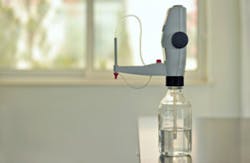Testing devices for regulations and customer satisfaction
According to the many experts that we have interviewed over the years, testing unkown or problem water is the first and most crucial step in effective water treatment. Regardless of the treatment technology requested, customers and water treatment dealers must know what is in a homeowner’s or business owner’s water. Fortunately, today’s labs and field testing equipment are providing accurate and detailed information about water quality, detecting contaminants at such low levels never thought possible.
Meeting regulation requirements
Analytical testing equipment technology has advanced greatly over the past few years. In general this equipment is being used for two purposes: To meet a regulation level or gauge contamination for treatment.
In a recent article published in Water Technology by Marianne Metzger titled, “Choosing the best testing methods for your sample comes down to good lab communication,” variables that affect testing and water samples were provided.
According to Metzger, “Regulations can often drive what testing methods are used based upon lab certification. For example, under the Safe Drinking Water Act (SDWA) public water supplies are required to perform certain tests. The SDWA spells out which methods are approved to perform the required testing under these regulations.”
To read this entire article, click here.
Analytical equipment
Such analytical testing methods using colorimetry and spectrophotometery, as examples, are common to most water treatment dealers. And, these analytical testing technologies have been around for over 60 years. According to experts we have interviewed for previous articles, the core of today’s testing equipment, including colorimetry, spectrophotometery and titrations, have not changed much since the 1950s.
While today’s technologies build off these early innovations, advances have been made in the areas of price, precision, convenience, sensitivity, consistency and efficiency.
In the past 10 years, digital testing has been one vast improvement in today’s field equipment. We recently interviewed several analytical testing experts in an article titled, “The modern way to test water.” You can read that entire article by clicking here.
Enhance your professionalism and customer service
Reputable water treatment dealers understand the value in testing problem water prior to offering equipment or chemical treatment. These dealers know that an educated customer, who also appreciates testing, is willing to pay more for solutions and the equipment you offer.
Today’s field testing equipment provides customers with a better idea of such water conditions as pH, chlorine (free and total), hardness, alkalinity, conductivity, iron and more.
While field testing is easier to conduct, understand and use today, laboratory tests will continue to maintain importance for dealers, customer health and our industry as a whole. For example, some experts recommend testing contaminants that are hazardous to human health in the field as well as in a lab. As examples, pesticides and bacteria are common contaminants that dealers should require a good lab testing for.
If you are looking to upgrade your existing testing equipment or looking to purchase for the first time, please be sure to visit our Online Buyers’ Guide for leading manufacturers in this area of water technology products. Suppliers of testing equipment can be found here.
